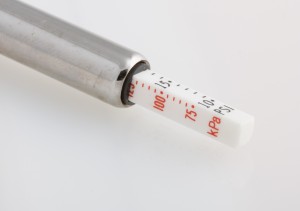 A recent article in the Huffington Post showcased six myths about saving on gas. One of those myths was nitrogen tire inflation because the difference is negligible, and tires filled with air at proper tire pressure will achieve the same results. Prepare for this myth to be busted.
A recent article in the Huffington Post showcased six myths about saving on gas. One of those myths was nitrogen tire inflation because the difference is negligible, and tires filled with air at proper tire pressure will achieve the same results. Prepare for this myth to be busted.
We grant that proper tire pressure is what it takes to achieve greater fuel efficiency, but the way the myth is presented in the Huffington Post article presumes that regular air and nitrogen gas react the same way in consumer tires and in the tires of managed fleet vehicles. The only times the two react differently is in commercial aircraft and high-performance race cars, since they undergo much more extreme temperature changes than a typical four-door driver or long-haul driver.
However, regular air does react to even the less extreme temperate changes that take place as one drives to the store or across state lines. Why else would it be recommended to check tire pressure when the tires are cold? What would be the point of this recommendation if regular air didn’t react under normal driving circumstances? Well, regular does react under those circumstances, and when it is used, it warms up as the car is driven, increasing the tire pressure. Checking the tire pressure when the tires are warm could give a false reading of a tire pressure higher than what it actually is. This could cause someone to release tire pressure that’s needed, or not fill up when they really should.
Nitrogen gas maintains proper tire pressure better and for a longer period of time because it doesn’t react to temperature changes nearly as much as regular air. This reaction takes place in the tires you get from your local auto repair shop as well as the tires on race cars and commercial aircraft. Fuel efficiency increase three to five percent with properly inflated tires versus under-inflated tires. With gas prices going up, that kind of fuel efficiency is much more than “negligible” to some people.
True, some dealerships and auto repair shops may charge for nitrogen, but some do provide the service for free. Some sell brand new tires that are already filled with nitrogen. The core of this myth is busted, since the core argument was that commercial aircraft and high-performance vehicles need it to handle the extreme temperature changes. However, temperature changes still take place in regular driving, so it’s reasonable to conclude nitrogen can make a difference to consumers and to managed fleets as well.





